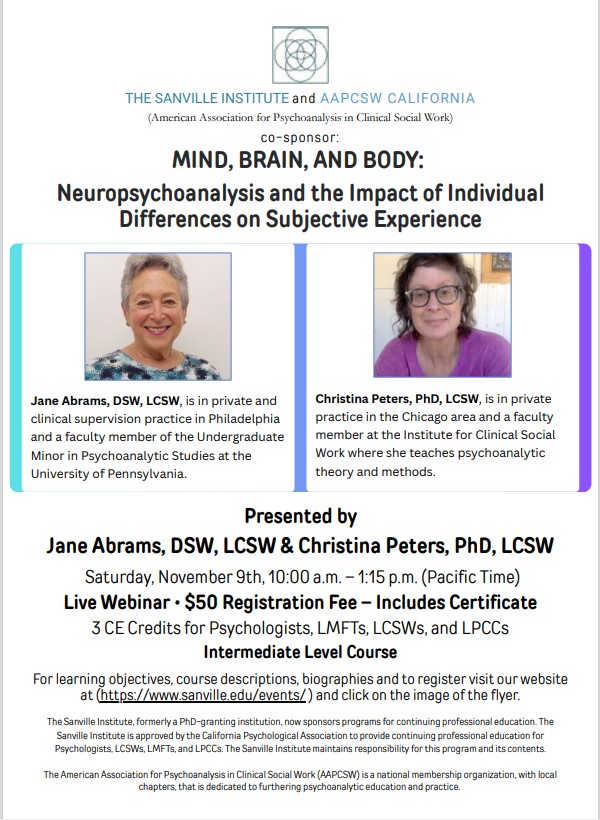
- This event has passed.
Mind, Brain, and Body: Neuropsychoanalysis and the Impact of Individual Differences on Subjective Experience
November 9, 2024 | 10:00 am - 1:15 pm PST

- Location: Live Webinar. You will receive the Zoom link after you register.
- Presenters: Jane Abrams, DSW, LCSW & Christina Peters, PhD, LCSW
- Date: Saturday, November 9, 2024
- Time: 10:00 a.m. – 1:15 p.m. (Pacific Time)
Course Description
Jane Abrams – Neuropsychoanalysis:
Dr. Abrams will describe how affective neuroscience, the science of memory and predictive coding form the foundation, along with psychoanalytic theory, of neuropsychoanalysis. She will highlight how neuropsychoanalysis both supports and has led to revisions of many of Freud’s ideas. Case examples of clinical applications will be provided.
Christina Peters – Complexity and the Body:
Dr. Peters will amplify how individual neurobiological differences shape our ways of perceiving, experiencing, and understanding intersubjective meanings and the subsequent processes of self-cohesion. Clinical material will be used to explore how these differences add depth and complexity to our understanding of the patient’s experience and enhance therapeutic empathy.
Presenters’ Bios
Jane Abrams, DSW, LCSW, maintains a private psychotherapy and clinical supervision practice in Philadelphia. She is on the faculty of the Undergraduate Minor in Psychoanalytic Studies at the University of Pennsylvania and teaches in the MSW and DSW programs. As an active member of the Neuropsychoanalytic Association, she is chairperson of the Relational Theory Group and is Research Digest editor and co-editor of the Bulletin for the journal Neuropsychoanalysis. She is Regional Chair of the American Association of Psychoanalysis in Clinical Social Work.
Christina Peters, PhD, LCSW, is in private practice in the Chicago area and a faculty member at the Institute for Clinical Social Work where she teaches psychoanalytic theory and methods. She has presented internationally at conferences and published on topics related to individual differences and the impact on subjective experience, using that understanding to deepen empathy and broaden our understanding of the relational experience. She is a member of NSPS, AAPCSW, IAPSP, and IARPP.
Course Level
This program is designed for psychologists, LMFTs, LCSWs, and LPCCs; instructional level is intermediate.
Learning Objectives
-
- Participants will be able to identify how findings in affective neuroscience, memory science and predictive coding have led to revisions of some of Freud’s ideas and to strengthening the scientific underpinnings of others.
- Participants will be able to describe how neuropsychoanalysis can enhance clinical practice.
- Participants will be able to explain how neurobiological differences impact interpersonal and intrapsychic dynamics.
- Participants will be able to describe the role that neurobiological factors have on a therapist’s formulations and ability to fully empathize with the patient’s experience.
Credit
3.0 Hours of Continuing Education Credit
Fee
$50 (Includes certificate)
The Sanville Institute, formerly a PhD-granting institution, now sponsors programs for continuing professional education. The Sanville Institute is approved by the California Psychological Association to provide continuing professional education for Psychologists, LCSWs, LMFTs, and LPCCs. The Sanville Institute maintains responsibility for this program and its contents.
The American Association for Psychoanalysis in Clinical Social Work (AAPCSW) is a national membership organization, with local chapters, that is dedicated to furthering psychoanalytic education and practice.
